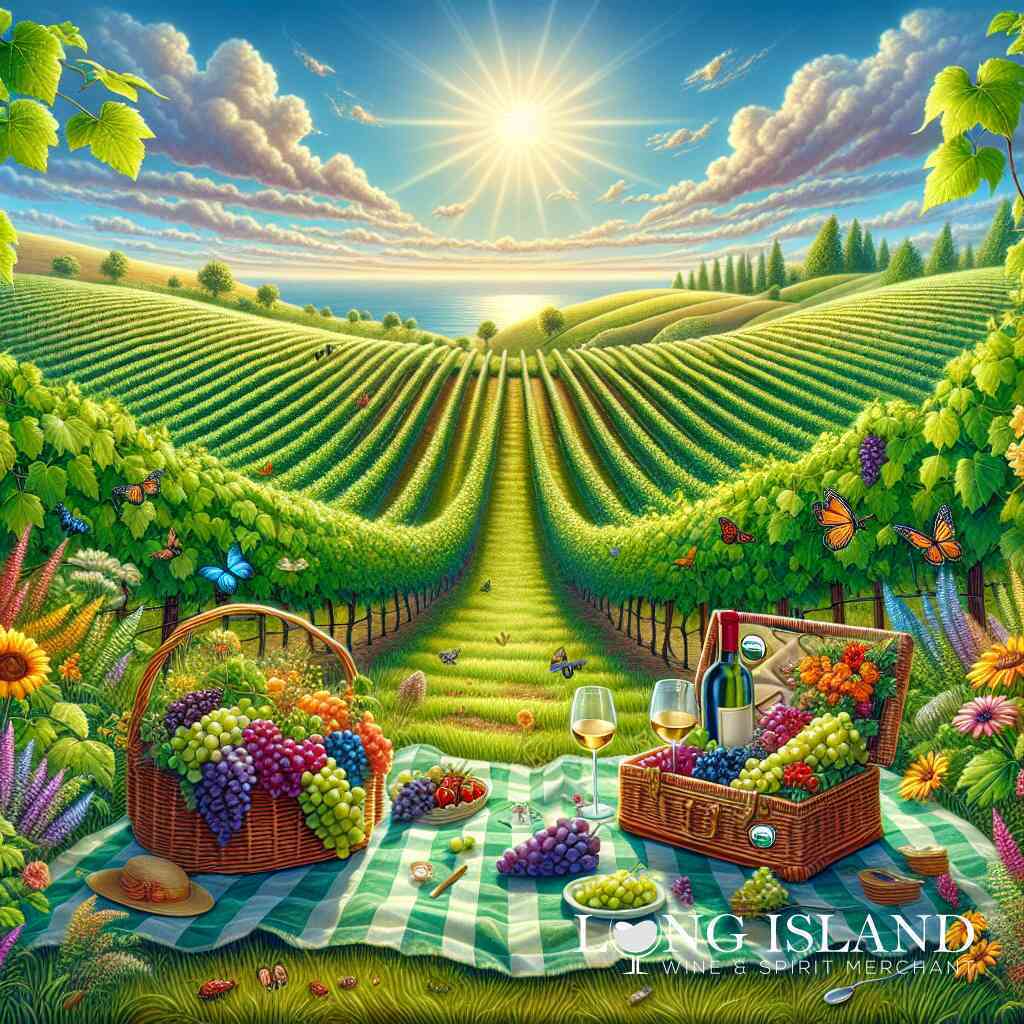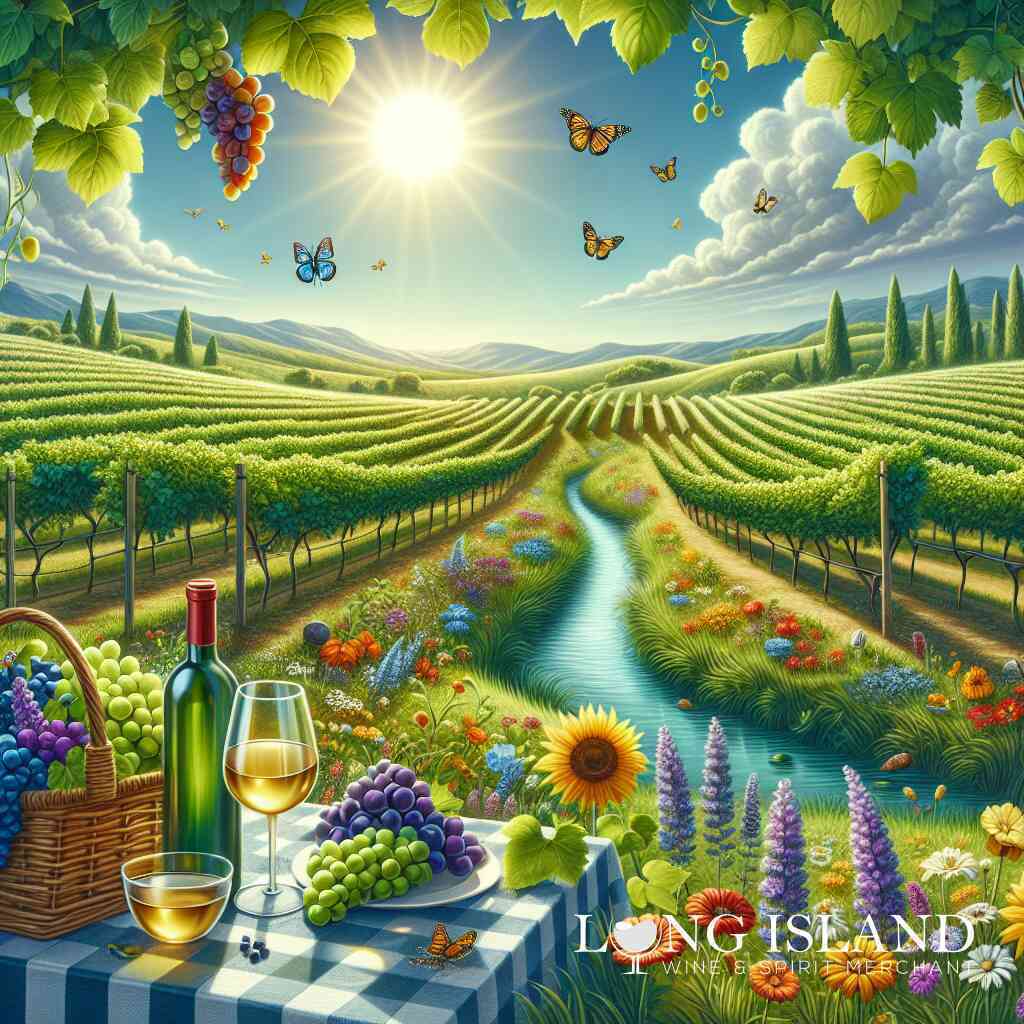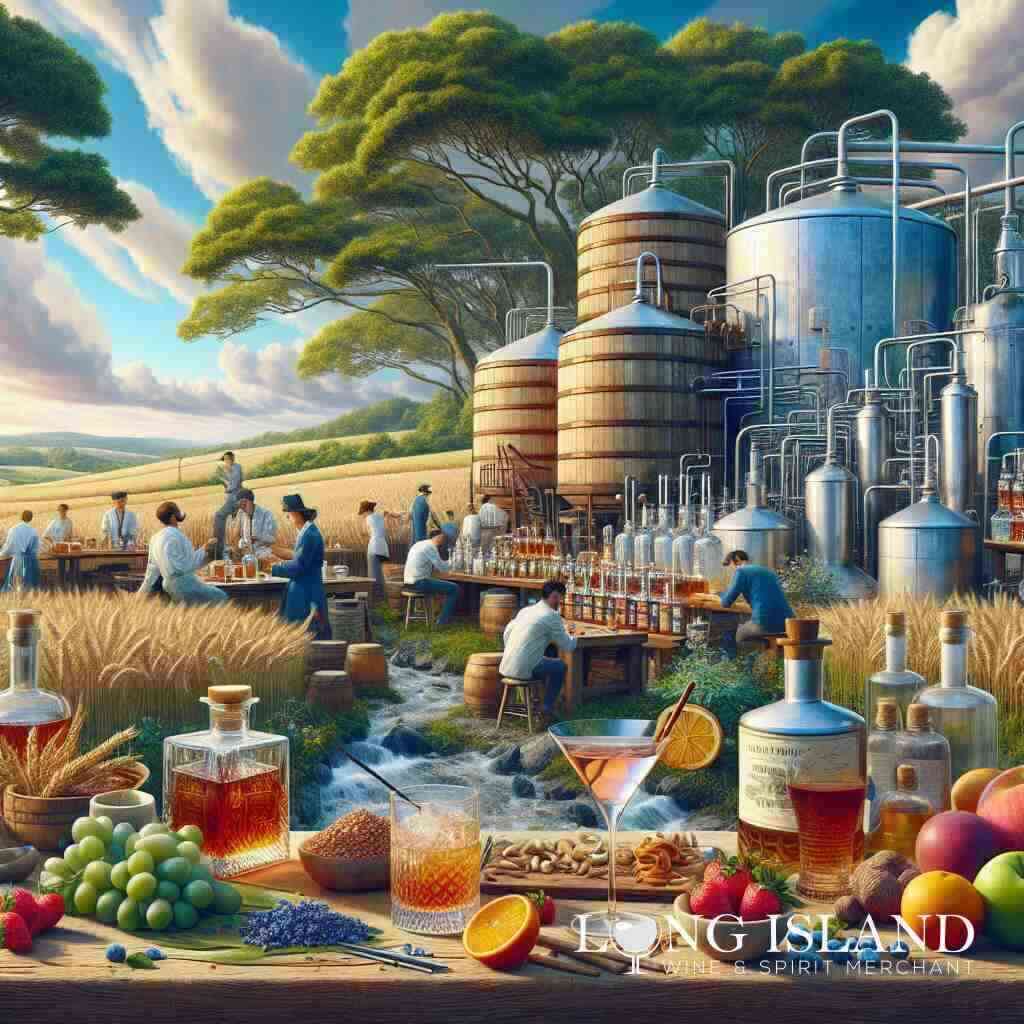
What Does Organic Wine Really Mean?
July 8, 2024
Unveiling the Essence of Organic Wine
Defining Organic Wine
Organic wine represents more than just a label or a certification; it is an embodiment of a commitment to environmental stewardship and natural wine-making practices. At its core, organic wine comes from grapes that are grown without the use of synthetic pesticides, herbicides, fungicides, or fertilizers. The philosophy extends beyond the vineyard to encompass a holistic approach to farming that emphasizes biodiversity, soil health, and ecological balance. When you explore the selection of organic wines at Long Island Wine & Spirit Merchant, you’re not just purchasing a bottle of wine; you’re investing in a process that prioritizes the purity of the wine in your glass and the well-being of the planet.
The Legal Standards for Organic Certification
Organic certification for wines is not a badge quickly earned. In the United States, the legal standards for organic wine are stringent and multifaceted, governed by the United States Department of Agriculture (USDA). These standards require that organic wines must be made from organically grown grapes and outline strict guidelines regarding the wine-making process, including limitations on sulfite additions. Certified organic wines must comply with not only how the grapes are grown but also how the wine is processed, ensuring that every step from the soil to the bottle adheres to rigorous organic standards. It’s a testament to the dedication of vineyards to maintaining practices that protect the environment and produce wines of exceptional purity and taste.
The Difference Between Organic, Biodynamic, and Sustainable Wine-making
While all three practices-organic, biodynamic and sustainable winemaking-share a common goal of environmental stewardship, they each have unique principles and methodologies. Organic wine-making focuses primarily on the absence of synthetic chemicals in the vineyard and strict guidelines in the wine-making process. Biodynamic wine-making, influenced by the principles of Rudolf Steiner, takes a more esoteric approach, viewing the vineyard as a closed system and utilizing preparations made from fermented manure, minerals, and herbs. Sustainable wine-making, on the other hand, embraces a broader perspective, emphasizing not only environmental health but also social and economic sustainability. While each approach offers its route to eco-conscious wine production, they collectively signify a move towards more thoughtful and responsible wine-making practices, highlighting a growing demand among consumers for wines that are not only delicious but also ethically produced.
The Organic Vineyard: A Different Approach to Grape Growing
Organic Grape Growing Practices
Organic grape growing is a departure from conventional viticulture, focusing on fostering a harmonious relationship between the vineyard and its natural surroundings. By adhering to organic principles, vineyard managers at places like Long Island Wine & Spirit Merchant choose to employ natural substances and biological processes to enhance soil fertility and control pests. This approach emphasizes the use of compost, green manure, and cover crops to enrich the soil, alongside introducing beneficial insects that prey on harmful pests. Moreover, organic viticulture prohibits the use of genetically modified organisms (GMOs), ensuring that the grapes develop in tune with the environment’s natural rhythms. This holistic practice not only supports the ecosystem but also yields grapes that are a true expression of their terroir, leading to wines with distinctive character and purity. Discover more about organic vineyard practices near Commack and how they contribute to the quality of your wine.
The Role of No Chemical Pesticides in Vineyard Health
The absence of chemical pesticides in vineyards is critical to the organic ethos. By eliminating synthetic chemicals, organic vineyards promote a healthy, vibrant ecosystem capable of sustaining itself. Without these pesticides, the soil retains its natural vitality, fostering a diverse microbial life that aids in nutrient uptake and improves grape quality. Furthermore, this approach safeguards surrounding wildlife and water sources from contamination, contributing to a healthier environment for all. Wine enthusiasts seeking eco-friendly options will appreciate knowing their favorite beverage is produced in a manner that respects the earth. Wines coming from organically managed vineyards, free from chemical residues, offer a cleaner, more authentic taste experience.
Understanding Biodynamic Agriculture in the Context of Wine
Biodynamic agriculture takes organic farming to a deeper, spiritual level, integrating astrological influences and lunar cycles into the cultivation of vines. This method, which can be seen as an extension of organic practices, emphasizes the farm or vineyard as an autonomous entity. Special preparations, made from herbs, minerals, and animal manures, are used to enhance soil and plant health, while planting and harvesting are often timed to coincide with lunar phases. Biodynamic wine-making views the vineyard as a living system, with every element, from the soil to the stars, playing a role in the development of the wine. This approach has been adopted by some winemakers around the world, including those on Long Island, who believe biodynamic practices contribute to the vibrancy, complexity, and expressiveness of their wines. By embracing biodynamic principles, winemakers are able to produce wines that are not only organically certified but also deeply reflective of their environmental and cosmic context, offering a unique and enriching tasting experience for wine enthusiasts who support organic winery efforts near Commack.
From Vineyard to Wine Glass: The Organic Wine Production Process
The Steps in Making Organic Wine
The journey of organic wine from vineyard to wine glass is a testament to meticulous care and environmental respect. This process begins with the harvest of organically grown grapes, which are then carefully sorted to ensure only the healthiest, ripest grapes make it into the batch. Once selected, the grapes are gently pressed, and the juice is fermented. Fermentation, a crucial step in wine-making, is where the magic happens: sugars are transformed into alcohol. Organic wine-making often employs wine fermented naturally, using native yeasts found on the grape skins and in the vineyard environment. This natural yeast imparts unique flavors and character to the wine, creating a beverage that genuinely reflects its origins and the meticulous attention to detail of its makers.
How Sulfite Use Differs in Organic Wine-making
Sulfites have been a common addition to wines for centuries, acting as preservatives to prevent oxidation and spoilage. However, in organic wine-making, the approach to sulfite use is distinctly different. Standards vary by region, but generally, organic wines contain lower levels of sulfites compared to conventional ones. In the United States, for instance, certified organic wines must contain less than 20 parts per million (ppm) of sulfites, earning the distinction of being “sulfite-free” or having “no added sulfites.” This restriction encourages organic winemakers to explore alternative methods to ensure their wines’ longevity and purity, leading to innovative wine-making techniques that align with the overarching philosophy of minimal chemical intervention.
Organic Wine Labels and What They Tell You
When browsing Long Island wine outlets online or in-store, you’ll notice that organic wine labels carry specific certifications that assure consumers of the wine’s organic integrity. In the United States, the USDA Organic seal is the gold standard, indicating that the wine meets stringent organic production and processing standards. Labels may also specify if a wine is “made with organic grapes,” highlighting the use of organic fruit without adhering to the stricter no-added sulfites requirement. Understanding these labels empowers wine enthusiasts to make informed choices that reflect their preferences for eco-conscious and health-minded drinking experiences. By familiarizing themselves with organic wine labels, consumers can confidently navigate the selection of organic wines, ensuring they enjoy high-quality wines that align with their values and taste preferences.

Exploring the Benefits and Range of Organic Wines
The Health and Environmental Advantages of Choosing Organic
Choosing organic wines comes with numerous health and environmental benefits that cater to both eco-conscious wine drinkers and those looking for a lifestyle that supports well-being and sustainability. The prohibition of synthetic chemicals in organic farming promotes a healthier ecosystem within the vineyard, fostering biodiversity and reducing harmful runoff into our water systems. For health-conscious individuals, organic wines offer a cleaner option, with studies suggesting that they may contain higher levels of antioxidants like resveratrol due to the grapes being grown in healthier soil. Additionally, the strict regulations surrounding organic certification ensure that consumers are getting a product that truly aligns with organic principles. For those interested in the health benefits of organic red wine, it’s worth noting that these wines are not only better for the environment but could also offer some added health benefits thanks to their production processes.
Tasting the Difference: Organic Red, White, and Rose Wines
Organic wines often present unique flavor profiles that reflect the true essence of their terrain, known as terroir. Without the interference of synthetic chemicals, the grapes can fully express the characteristics of the soil and climate in which they are grown, leading to more nuanced and distinct tasting wines. Red wines might display a deeper, more robust flavor, whites a crisp and fresh vibrancy, and roses a delicate yet complex bouquet. This diversity is a testament to the vineyard’s commitment to maintaining balance with nature and allowing the grapes to speak for themselves. At Long Island Wine & Spirit Merchant, customers are invited to explore an extensive selection of organic wines that encapsulate these differences, offering a journey through flavors that are as educational as they are enjoyable.
Spotlight on Long Island Wine & Spirit Merchant’s Organic Selection
Long Island Wine & Spirit Merchant stands as a beacon for those seeking organic wines, with a meticulously curated selection that highlights the beauty of organic viticulture. From the rich, earthy notes of a full-bodied organic red to the light and airy touch of an organic white or rose, their collection is a testament to the diversity and quality that organic wine-making can yield. Customers are encouraged to explore Long Island’s leading organic spirits, each selected for their exceptional taste and adherence to organic principles. By prioritizing organic and biodynamic labels, Long Island Wine & Spirit Merchant offers a portfolio that not only appeals to the palate but also resonates with the values of those who prioritize health, sustainability, and the environment. Whether you’re a seasoned wine enthusiast or a curious newcomer, their selection is designed to enlighten, inspire, and delight, bridging the gap between fine wine and good spirits with a conscious choice.
How to Enjoy and Where to Find Organic Wines
Tips for Tasting and Pairing Organic Wine
Embarking on the journey of organic wine tasting offers an enriching experience that transcends the traditional wine-drinking norms. The intricate process from soil to sip can be fully appreciated when you understand the essence and ethos behind organic wine-making. Initiate your tasting adventure by engaging all your senses. Observe the wine’s color and viscosity; swirl to release its bouquet. Inhale deeply to discern the nuanced scents influenced by the organically farmed grapes’ environment. When tasting, let the wine linger to identify the complex flavors and textures that only organic wine-making methods can unveil.
Pairing organic wines with food elevates both the culinary and drinking experience. Since these wines are often more expressive of their terroir, they can complement a range of dishes that share a similar ethos of simplicity and sustainability. Fresh, locally sourced ingredients that mirror the organic wine’s authenticity can enhance the inherent qualities of both the beverage and the meal. For instance, an organic white wine with crisp acidity may perfectly accentuate the flavors of a farm-fresh vegetable dish. In contrast, a robust, organic red could harmonize with pasture-raised meats or earthy legumes.
Ordering Organic Wine Online from Long Island Wine & Spirit Merchant
In today’s digital age, enjoying fine organic wines from the comfort of your home has never been easier. Ordering eco-friendly wine on Long Island can be done promptly through Long Island Wine & Spirit Merchant’s user-friendly online platform. This facilitation not only supports local businesses but also opens up a gateway to explore and discover an extensive selection of top-tier organic wines. With a commitment to providing exceptional service, Long Island Wine & Spirit Merchant ensures that every bottle from their meticulously selected organic range is delivered with care directly to your doorstep. Whether looking for a specific vineyard’s latest organic offering or eager to experiment with a curated case of assorted organic wines, their online platform is designed to meet the demands of both novice enthusiasts and seasoned connoisseurs alike.
Joining Organic Wine Tasting Events
One of the most immersive methods to delve into the world of organic wines is by participating in eco-conscious wine-drinking events on Long Island. These gatherings not only offer a chance to taste a diverse array of organic wines in a convivial atmosphere but also provide valuable insights into the wine-making process, shared directly by vintners and expert sommeliers. Eco-conscious wine-drinking events on Long Island serve as educational platforms, shedding light on the nuances that distinguish organic wine-making and the significance of choosing sustainably produced wines. Engaging with the community at these events strengthens the bond between consumers and producers, fostering a collective commitment to sustainability and quality. It’s an exhilarating opportunity to expand one’s palate, learn in-depth about organic viticulture, and connect with like-minded individuals who share a passion for environmentally responsible wine enjoyment.

Raising a Glass to the Future: The Growth of Organic Wine-making
The Rising Popularity of Organic Wines
The global landscape of wine consumption is undergoing a profound transformation, underscored by a robust surge in the demand for organic wines. This burgeoning interest is not merely a trend but a reflection of a deeper, more conscientious consumer mindset prioritizing health, sustainability, and authenticity in their beverage choices. Absent the use of synthetic chemicals and with a dedication to preserving the natural essence of the grape, organic wines offer a purity and terroir-driven complexity that has captivated the palates of wine enthusiasts worldwide. The movement towards organic viticulture resonates with the growing eco-awareness, as the wine industry mirrors society’s broader shift towards environmental responsibility and natural well-being.
The appeal of organic wines is multifaceted, reflecting a blend of ecological benefits, health considerations, and a quest for quality. These wines are produced under strict guidelines that ban the use of genetically modified organisms (GMOs) and limit the use of additives, offering a cleaner, potentially healthier alternative to their conventional counterparts. Furthermore, the focus on manual labor and sustainable farming practices enriches the biodiversity of vineyards, enhancing soil health and contributing to a healthier ecosystem. Consequently, the organic wine segment is experiencing exponential growth, with vineyards across the globe converting to organic practices to meet the surging demand.
Challenges and Opportunities in Organic Viticulture
Transitioning to organic viticulture presents a unique set of challenges and opportunities for winemakers. One of the foremost challenges is the susceptibility of organic vineyards to pests and diseases, given the restriction on synthetic pesticides and fungicides. This vulnerability necessitates innovative natural solutions and a proactive approach to vineyard management, often leading to increased labor and costs. Moreover, achieving organic certification entails rigorous standards and compliance, potentially deterring smaller vineyards with limited resources.
However, these challenges are counterbalanced by significant opportunities. The organic wine market’s rapid growth opens new avenues for wineries to distinguish themselves and cater to a niche yet expanding market segment. Furthermore, organic farming practices, by enhancing soil health and biodiversity, can lead to more resilient vineyard ecosystems, potentially yielding superior grape quality and wine expression over time. Organic wine-making also aligns with global sustainability goals, offering vineyards the chance to contribute positively to environmental conservation and climate change mitigation.
The Role of Wine Enthusiasts in Supporting Organic Wineries
Wine enthusiasts play a pivotal role in the growth and success of the organic wine industry. Their purchasing decisions can drive demand, incentivize vineyards to adopt organic practices, and ultimately shape the future of wine-making. By choosing organic wines, consumers signal a preference for products that align with ethical and environmental values, encouraging more wineries to undertake the organic certification process. Wine enthusiasts support an organic winery near Commack, showcasing a growing community of informed consumers dedicated to promoting sustainability through their wine choices.
Additionally, wine enthusiasts can advocate for organic wines by participating in tastings, sharing knowledge about the benefits of organic viticulture, and supporting wineries that prioritize environmental stewardship. Engaging in conversations about organic wine, whether through social media, wine clubs, or community events, helps to elevate the profile of organic wineries and spread awareness about the importance of sustainable practices in the industry. As the organic wine movement continues to gain momentum, the collective support of wine enthusiasts will be instrumental in shaping a future where organic wine-making is not just a niche but a fundamental aspect of the global wine industry.
Frequently Asked Questions
Question: What does the process of producing organic wine entail, and how does Long Island Wine & Spirit Merchant ensure the quality of their organic selection?
Answer: The process of producing organic wine starts with organic grape growing, where vines are cultivated without synthetic pesticides, herbicides, fungicides, or fertilizers. At Long Island Wine & Spirit Merchant, we prioritize sourcing wines that adhere to strict organic farming practices and are USDA organic wine certified. This means the vineyards we partner with maintain a holistic approach to farming- a commitment to environmental stewardship, biodiversity, and soil health. By choosing wineries that employ sustainable wine-making techniques and are certified for their organic practices, we ensure our selection meets the highest quality and purity standards, offering our customers the finest eco-friendly wine choices.
Question: Can you explain the difference between organic wine, biodynamic wine, and sustainable wine-making, and how Long Island Wine & Spirit Merchant caters to enthusiasts of each?
Answer: Organic wine is made from grapes grown in accordance with organic farming principles, primarily focusing on the absence of chemical pesticides and fertilizers. Biodynamic wine takes organic practices a step further, incorporating esoteric philosophies that view the vineyard as a closed, self-sustaining ecosystem and emphasize astrological influences and lunar cycles. Sustainable wine-making refers to practices that are not only environmentally friendly but also socially and economically viable, focusing on the long-term health of the wine production ecosystem. Long Island, Wine & Spirit Merchant, offers a curated selection of wines that cater to enthusiasts of all three categories. Our extensive portfolio includes organic wines with no chemical pesticides, biodynamic wines produced in harmony with the cosmos, and wines made through sustainable methods, ensuring eco-conscious wine-drinking options for every preference.
Question: In the blog post ‘What Does Organic Wine Really Mean?’ It is mentioned that organic wines often have distinctive taste profiles. How does Long Island Wine & Spirit Merchant help customers navigate these differences to find their perfect organic wine?
Answer: Long Island Wine & Spirit Merchant prides itself on our knowledgeable staff and our dedication to customer education. Customers interested in discovering the unique taste profiles of organic wines can take advantage of our in-store tastings, personalized recommendations, and our wine taste quiz. Through these avenues, we provide insights into the nuances of organic viticulture and how it influences wine flavor. With our vast selection of organic red wine, organic white wine, and organic rose wine, we guide customers through tasting the difference, ensuring they find their perfect wine match that resonates with their palate and values of eco-conscious wine drinking.
Question: How does Long Island Wine & Spirit Merchant support the growth of organic wine-making and the broader movement towards eco-friendly wine consumption?
Answer: At Long Island Wine & Spirit Merchant, we are deeply committed to supporting the growth of organic wine-making and fostering a culture of eco-friendly wine consumption. By carefully selecting vineyards and wineries that adhere to certified organic wine production methods, we are investing in the future of green wine. We actively promote organic, biodynamic, and sustainably made wines, highlighting their benefits and the importance of such practices for the environment and personal health. Additionally, we host organic wine-tasting events and educational workshops to raise awareness among our community. By choosing to prioritize these eco-conscious wine options in our selection, we hope to encourage more wine enthusiasts to support organic and sustainable wine-making practices.
Question: What should customers look for on the labels when selecting an organic wine from Long Island Wine & Spirit Merchant to ensure it meets their eco-friendly and health-conscious criteria?
Answer: When selecting an organic wine from Long Island Wine & Spirit Merchant, customers should look for specific certifications and keywords on the label to ensure the wine meets their eco-friendly and health-conscious criteria. The USDA Organic seal is a primary indicator of organic certification and guarantees that the wine meets strict organic production and processing standards. Labels may also state “made with organic grapes,” signifying the use of organically grown grapes while allowing for some flexibility in wine-making methods, such as minimal sulfite additions. Additionally, customers might find terms such as “sulfite-free,” “no added sulfites,” or “vegan wine,” which provide further assurance of the wine’s purity and adherence to organic principles. Our staff is always available to assist customers in understanding these labels, ensuring they make informed selections that align with their preferences for high-quality, eco-friendly wines.



